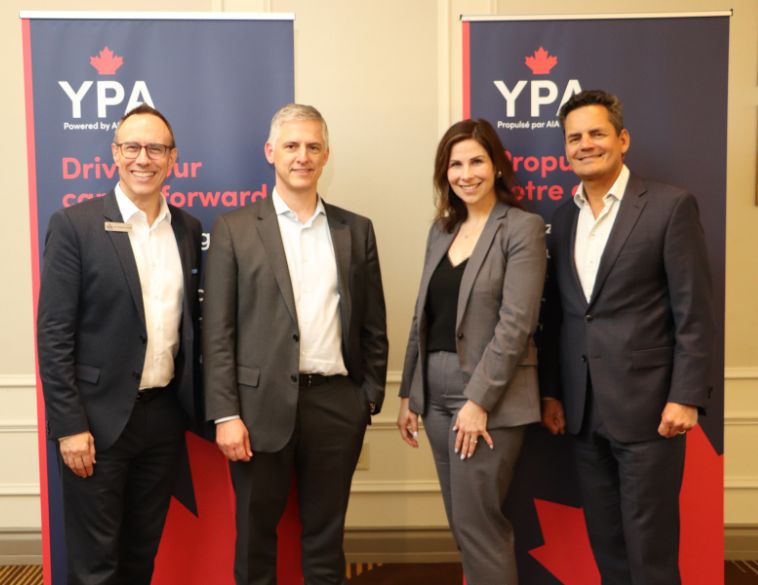In an exclusive interview with Autosphere, Shannon Spano reflects on her time as AIA Chair
Shannon Spano, Vice President, Sales, Wakefield Canada, was appointed AIA Chair in 2023. Her tenure came at a time of immense change happening within the auto care sector and the automotive industry as a whole. Spano recently sat down with Autosphere to reflect on her time as Chair, including some highlights during her tenure as well as takeaways from being in this prominent role.
Autosphere: In taking on the role as AIA Chair did you have some expectations going in?
Shannon Spano: Coming into the role, I had lofty goals and expectations. One, was to meet and get to know as many members as possible, as well as getting out to numerous events and experiences. Another big aspect was advocating for Right to Repair as well as diversity within the workplace. I would say that being AIA Chair is a very unique role and it’s important to immerse yourself in it. There’s a lot to learn and many different perspectives, and a key part is being able to bring value both to the association membership as well as the board of directors by doing your best to ensure things run as smoothly as possible. There’s been a lot of change in this industry over the last few years and we’ve been faced with multiple challenges, but also opportunities. Among the conversations we’ve had at the board level—building a strategy for the future has been at the forefront, since the goal is to ensure we are able to set up the association and the auto care industry for success today and tomorrow.
AS: Looking back, what were some of the major highlights/accomplishments from your time as AIA Chair?
SS: I’ll start first with Diversity Equity and Inclusion (DEI). For me that was very personal. For this one, I really dug into my 10 years of experience within the industry and highlighting the importance of diversity among the workforce. I feel it is very important to have different voices at the table and make opportunities open to as many different people as possible, from all walks of life. Canada has many regional and cultural differences, and it was really important to have deep, meaningful conversations and talk about how regional perspectives are when it comes to an overall national strategy. I felt this was very powerful; since it enables us to learn more about ourselves, as well as what’s required to be an effective leader. It also allows us collectively, to understand the needs of people within this industry and what we can do to continuously improve and move forward. A core foundation of a good association is strength in numbers and the ability to effectively represent the industry it serves. Ultimately, it’s about people whether it’s our colleagues, association members, industry professionals or customers.
AS: Can you tell us about some of the advocacy efforts that came about during your time as AIA Chair?
SS: A big development has been Right to Repair. We’ve been making some very solid progress over the last year as we’ve seen in Quebec, with the passing of Bill 29, which represents a very significant step, setting the tone for rolling out at a national level. The conversations around Right to Repair are changing, and we’re seeing more involvement from the OEMs. While on the surface, this might seem to run counter to the traditional aftermarket view, what it does demonstrate is that our voice is being heard and that strength in numbers can really make a difference. I have to say a big thank you to Alana Baker, AIA Canada’s Senior Director of Government Relations, as well as the members that volunteer their time for advocacy both at federal level and also through grassroot campaigns and media outreach efforts.
AS: Can you share some other aspects regarding Right to Repair?
SS: This legislation is really at the heart of consumer choice. Consumers should have the right to choose which businesses they take their vehicle to for maintenance and repair work and our advocacy efforts represent the need to modernize and update obsolete legislation around data access. We’ve seen how efforts like this really bring people together and create a sense of community and it doesn’t end with one effort or event, it’s a continuous process—one where you learn and adapt, developing agility and resilience, as you find ways to secure more support and funding.
AS: Another aspect you’re passionate about is membership engagement. Can tell us a little more about that?
SS: When I think about AIA Canada and what it means for me, 15 years ago it was all about in-person networking. The seminars, the golf tournaments, Canada Night in Las Vegas—all of these things. Since the pandemic, where we find ourselves working in a combined digital and physical world, there’s been a focus on providing maximum value. Today, both AIA Canada members and businesses might have different needs than they did a number of years ago, and for us as an association, it’s important that we continue to adapt and meet the needs of our members. For some, it’s gaining insights and having access to information, for others it is the ability to network with others or access specific needs, or advocacy rights and support by aligning with something that’s broader and bigger. A good example of the latter is AIA Canada’s partnership with I-CAR. Ultimately, it’s the membership value proposition that counts and AIA Canada is constantly looking for more ways to bring value to our members as we move forward.
AS: What do you feel is perhaps the biggest takeaway from being in this position?
SS: For me, I think there are a couple of things. As previously mentioned, I had big expectations going into this role, but once there it became more of a case of scaling back my ambitions and focusing on doing a few things really well. I also feel that for me it was a good learning principle that can be applied in your own business. At the end of the day, it’s about making progress, not necessarily achieving perfection. Little changes, done incrementally, can add very significant value, particularly over the long term, so a key takeaway for me, is don’t try and boil the ocean.
The second thing I would say is that you don’t, and you can’t know it all. You can learn something from every conversation you have. In my case, whether I was talking with an AIA Canada board member, association, or team member, or even a fellow industry professional, I was really grateful to have access to such amazing people and information. It is amazing to be able to see things from different perspectives, especially when you can apply that to your own personal business and career. In our industry, we’ve seen a tremendous amount of change, even within the last 12 months and there is a lot more coming. That’s why I believe, it’s so important to focus on personal and professional growth, as well as future proofing yourself and your organization. I think that is essential for our industry as we continue to position ourselves for longer term success.
AS: Given your prominent position within the aftermarket, what do you feel are some of the key things that have and will continue to influence the industry going forward?
SS: I think diversification is important. Businesses are going to have to think differently about how they bring value to consumers. The old, or historic models are not necessarily working any more, particularly as needs have and continue to change. Organizations that are looking for sustainable growth and longer-term strategies are focusing on diversification and adaptability to customer and market changes. Being successful requires having the right mindset and looking at things differently than perhaps we did in the past. That’s why it’s so important for us as an industry, to invest in our people and actively bring new faces into our sector. I’m so inspired by the Young Professionals in Auto Care and the younger people that I’m meeting in the industry. They have such great ideas and they’re very keen on creating a future for themselves. Even when I look at people like myself, who have been in the industry for some time and have around 15 years left of actively working, it’s important for us to also be consistently learning and finding new and creative ways to bring value, since ultimately that is what will drive our industry forward.
AS: What advice would you give to others looking to assume a role like this in today’s environment?
SS: That’s a great question. From my perspective, I think one thing to consider is that, when stepping into these kinds of roles, imposter syndrome can be a real thing. It’s easy to feel that you’re not ready for this, or you’re not going to add real value. Based on my own experiences, I would encourage others to just push themselves a bit, out of their comfort zone. There was a time where I couldn’t imagine being AIA Chair, let alone being in the Young Professionals in Autocare (YPA). But when you put yourself forward and take that step, it is amazing what can happen. Stepping into the role opens up a whole new world where you get understand the larger, macro factors as well as different ideas and experiences. It is these kinds of dynamics that can really help you as a leader, understand the marketplace, and what’s important. It’s extremely valuable and you can apply it to both yourself and the teams you work with in your organization. We’re often working so fast and so hard these days that the great conversations, we have, tend to go a long way.
AS: In view of your own career success, what do you feel are three most significant things for people to consider so they can thrive within the automotive aftermarket and enrich the people and environment around them?
SS: Firstly, I would say relationships. Ours is often referred to as a people industry, but I think a more accurate term is a “relationship industry.” As times are changing, relationships are the most important thing we have, and they will continue to be important in the future. So, you need to make sure your relationships are strong. And that means not only getting to know the people in your own organization, but other businesses around you. While the aftermarket auto care sector is a competitive industry, in many ways we aren’t really competitors, because we’re all trying to work on common issues, concerns and opportunities.
The second thing I would say, is be ready for change. While our industry is sometimes labeled as being “traditional” it has seen a lot of dramatic change. Whether it was the pandemic, or whether it’s new technologies, mergers and acquisitions, change is happening all the time and businesses are constantly evolving. Consumers’ needs are also changing, which is why it’s so important to embrace it all. And third, I would say, don’t define your success, since success itself is not linear. With that in mind, I would say it is really important to be open to opportunities and broadening your horizons, because the reality is, many of us don’t go straight up the ladder in our careers. Treat every opportunity as a learning experience and take time to volunteer or expand your knowledge and skill sets. By doing so, you add value to those around you and the organization, as well as helping yourself grow both professionally and personally. And I think it’s important to never lose sight of that, because it helps us become more versatile and stronger, as we build our careers.
AS: Looking to the future, is there anything you’d like to share with us today?
SS: I’d just like to say that it has been an honour to serve as AIA Chair. I’m very proud to be part of what the association has been able to accomplish. I feel I’m a stronger person and have gotten a better sense of the unique beauty of this industry, having been exposed to new ideas, concepts and ways of doing things. There’s no question that the auto care sector will continue to see more changes and challenges ahead, but I’m confident that the people in this industry will succeed through all of them, because they truly love this business. They want to see a future for it and for their organizations. Based on what I’ve experienced and the people I have gotten to know, I’m very optimistic about the road ahead for our industry.



